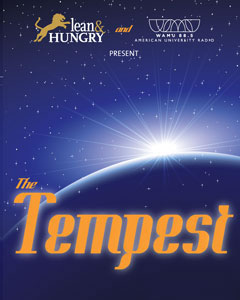The Tempest
A 1612 Space Oddity
Lean & Hungry Theater, WAMU 88.5 FM Radio, Washington, D.C.
Sunday, March 4, 2012
Directed by Hannah Todd
 The stated mission of Lean & Hungry Theater’s radio plays is to bring Shakespeare “to life,” the presumption being that Shakespeare’s texts are dead. This thinking is along the lines of a director I read about recently setting out to “make Shakespeare cool again.” News flash: Shakespeare has been cool for more than 400 years, generation after generation up to and including the Millennials. Not only have I many times witnessed text-centric Shakespeare productions rousing up kid-dominated audiences (at my age, “kids” are anybody 30 and under), but I see more kids at Shakespeare plays than at any other live theater, including musicals.
The stated mission of Lean & Hungry Theater’s radio plays is to bring Shakespeare “to life,” the presumption being that Shakespeare’s texts are dead. This thinking is along the lines of a director I read about recently setting out to “make Shakespeare cool again.” News flash: Shakespeare has been cool for more than 400 years, generation after generation up to and including the Millennials. Not only have I many times witnessed text-centric Shakespeare productions rousing up kid-dominated audiences (at my age, “kids” are anybody 30 and under), but I see more kids at Shakespeare plays than at any other live theater, including musicals.
That might be a warning to theaters that go to great lengths to alter Shakespeare’s structure and purposes by layering on some out-of-this world concept. Lean & Hungry ventured way out of this world with The Tempest, all the way to the “Naples Galaxy” in the “distant future” where tech-whiz Prospero and his daughter, Miranda, are living on a mysterious planet and Arial is a sentient computer system.
There’s nothing wrong with setting a Shakespeare play in the future: I’ve seen it work. There’s nothing wrong with giving The Tempest a science fiction setting: It’s been done often before (including an adaption as The Forbidden Planet). There is nothing wrong with Lean & Hungry’s re-imagining Shakespeare’s settings for its radio plays: The company did so promisingly with a Southern plantation–set Hamlet and brilliantly with a Prohibition-era gangland–set Midsummer Night’s Dream.
But whenever and wherever you set your Shakespeare, it is how you grasp and present his construct and context that makes your play. “Bringing Shakespeare to life” as if his works were some dead body is all well and good, but it’s still just a verse-mumbling zombie if it has no beating heart. Yes, zombies are cool right now, too, but a date with one would get pretty boring (and there’s that whole matter of their eating your brain, which is an apt allegory for presenting Shakespeare without its heart).
The Tempest lends itself to a sci-fi setting because it evolves out of the equivalent of a science fiction genre for Shakespeare’s time. Exploration of “the New World” was as exciting and cutting-edge to the Elizabethans as the explorations of other worlds are for us. Raleigh and Drake must have seemed like Armstrong and Glenn, and native American peoples and plants were displayed like moon rocks. Jamestown, England’s first permanent colony in America, was founded in 1607, about the time Shakespeare was writing Antony and Cleopatra and Coriolanus. Shakespeare apparently knew members of the Virginia Company and read the company’s account of a ship heading to Jamestown being wrecked in a mighty storm on the then-deserted Bahamas. The account of that shipwreck and its crew spending a year in the exotic paradise before they could refit their ship and continue on to Virginia is a prime candidate as one of The Tempest’s sources (some of the play’s lines echo the text of the account). Shakespeare’s exotic island, its mysterious native population, and the magic performed there is the stuff of both 1612 and 2012 fantasy.
Yet, while Shakespeare certainly was inspired by New World explorations to write and cast his play, he set The Tempest in the Mediterranean, and his protagonists are Italian royalty, not English entrepreneurs. The overarching theme is displacement: Everyone is somehow physically displaced, including the island’s native residents, and this existence mirrors their individual personal and emotional journeys, too. This is especially true of the airy spirit, Ariel, and of Prospero, the erstwhile Duke of Milan, whose growing devotion to magic led to his overthrow at the hands of his brother and his exile to the island. Prospero is unquestionably a sorcerer, and his magic is a wondrous thing, used as both a weapon and as a device for good. That’s the poignancy in Prospero discarding his magic at the end of the play and leaving behind his mystical powers before returning to civilization, where he will once again assume governing powers. This was a politically correct conclusion, as Shakespeare’s patron, King James, had written a treatise against witchcraft and black magic. But Shakespeare turns this political necessity into an emotional watershed moment for his play’s main character who decides he prefers, more than ultimate power, the comforts of home where every third thought can be his grave.
In the Lean & Hungry production, the narrator tells us that Prospero will set aside his “overwhelming obsession with science and technology.” Poignant, no? And Arial as a computer program being set free? Sounds like she becomes a virus. This is the kind of disconnect that can arise between a production’s visual (or aural) exoskeleton and Shakespeare’s textual heart. It happens when presumptuous producers (and narration writers, in Lean & Hungry’s case) focus solely on re-conceptualizing Shakespeare without grasping, first and fully, how doing so might adversely re-contextualize Shakespeare, leaving us even more lost on Shakespeare’s verse than we would have been without all the add-on narrative trappings.
This disconnect reached a crescendo with the play’s most famous speech, coming after Prospero programmed Arial to present a pageant celebrating the engagement of his daughter with Ferdinand, but then he suddenly quit it, vexed upon remembering that Caliban was plotting to have him assassinated. Prospero’s explanation that “our revels now are ended” cut out the middle of the speech and rushed into the final line of “We are such stuff as dreams are made on, and our little lives are rounded with a sleep,” spoken as the soundbite conclusion to a political philosophy. “Huh?” replied Ferdinand, as if to say, “You talk funny, future father-in-law.” Well, he does talk funny. Gone is the perspective of the displaced Prospero who, realizing that yet another betrayal is in the works at the very moment of his greatest joy, unspools his startling vision of the world ending in the same way his pageant had suddenly dissipated, leaving “not a rack behind”: it is a vivid vision of all mankind’s ultimate displacement. That’s a Whoa! moment, not a huh.
The production even suffered disconnects with its own concept. Prospero’s planet kept being referred to as an island. Milan was another planet in the Naples Galaxy: so what was the Italy that the Queen of Naples referred to? Caliban was a “hideous alien,” the narrator told us: hideous, OK; alien, no. He lived there: Prospero and Miranda were the immigrants. Prospero was able to get Miranda to sleep with a computer program he devised especially for her, as if this is a technology yet to come. Indeed, for all the technology Prospero reportedly created and the advanced artificial intelligence Arial supposedly represented, everybody talked as if they were using the primitive tools of a deserted island in the early 1600s, such as Prospero calling his joystick a staff. And, come on, a guy in the distant future will give up his overwhelming obsession with technology? That’s really science fiction since in 2012 we all need an almost-overwhelming obsession with technology merely to survive enough so that every third thought could be our grave.
Director Hannah Todd might have served the production’s intentions better by borrowing from George Lucas’ device of setting his Star Wars in the distant past in a galaxy far, far away. That, at least, would have given Lean & Hungry’s concept for The Tempest a freer reign to meld the technology portrayed with the text spoken. It would also have allowed the production to shift from technology as the be-all answer to the natural exoticism that is a constant undercurrent of The Tempest and remain within its hour-long time slot. Maybe I’m being passé here, but I still find mental images of the Bahamas, Caribbean beaches, and Pacific island paradises more wondrous than all the wow! stuff my iThings and game console can do.
This Tempest so excised the exoticism, it chopped out the play’s best lines, Caliban’s poetic description of the island. Then again, the music that prompted his speech (he left off after the first two lines) was “Daisy Bell (Bicycle Built for Two).” Granted, this song has a long lore in computer history, including a key role in the presentation of HAL 9000 in 2001: A Space Odyssey. However, as clever as that choice of song may be for the production’s concept, the lyrics of “Full fathom five” fit the tune less well than an Alanis Morissette lyric, and the melody does not prompt visions of riches ready to drop on us that, when we waked, we would cry to dream again.
Still, it was a shame to miss out on Jason Hentrich as Caliban giving the full speech. His performance, which included portrayals of an energetically innocent Ferdinand and a slyly cynical Sebastian, was the lone standout of this production. His Caliban was richly spoken poetry, even in his opening scene of curses, and though his accent devolved into something of a Bengali caricature as the production wore on, Hentrich maintained the verse-structured dignity Shakespeare gives Caliban (even when drunk) to the end of the play.
The Tempest holds so much potential in itself to make for truly magical radio. Lean & Hungry has shown in past broadcasts its ability to, as the company brags, bring Shakespeare to life. Unfortunately, with The Tempest, Lean & Hungry ended up burying Shakespeare certain fathoms in the earth, deeper than did ever plummet sound.
Eric Minton
March 9, 2012
Comment: e-mail editorial@shakespeareances.com
Start a discussion in the Bardroom


